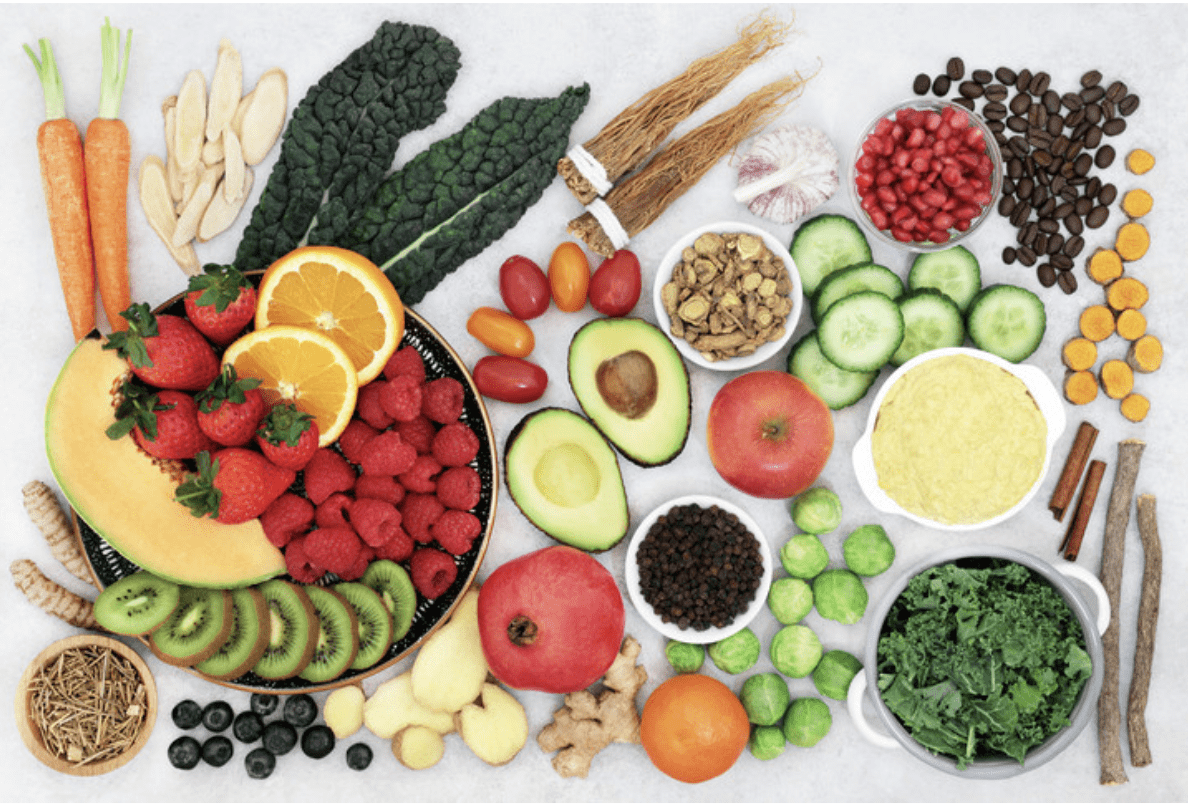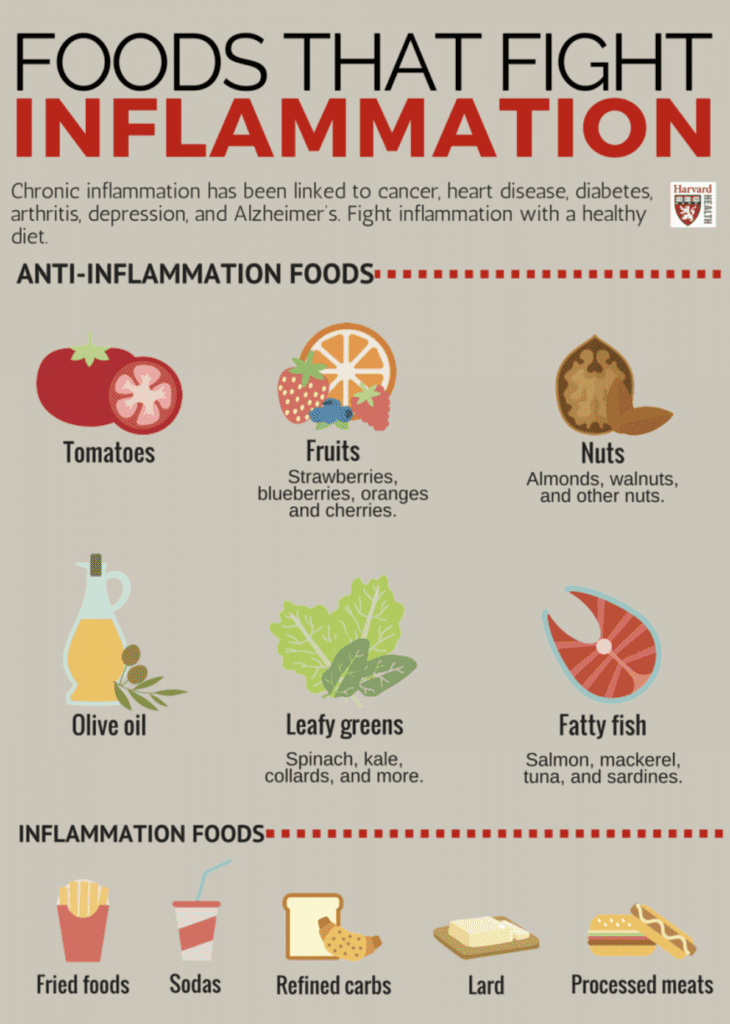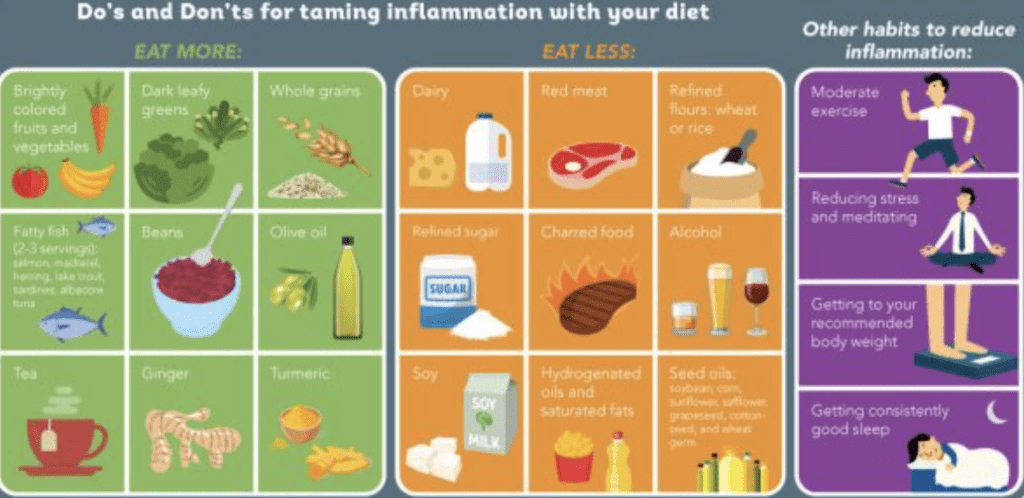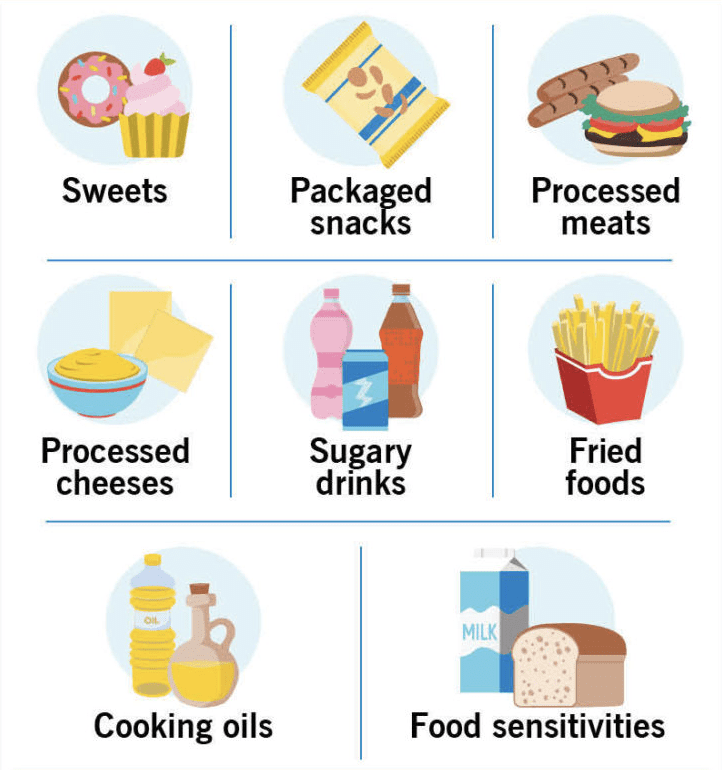All About Inflammation and The Body

All About Inflammation and The Body – How certain foods work to reduce inflammation in your body.
You need to have an anti-inflammatory lifestyle and diet.
That said, Mediterranean and plant-based diets, which are low in red meat and processed foods, can offer some protection against chronic inflammation.
The Mediterranean diet is a perfect example of an anti-inflammatory diet.
This is due to its focus on fruits, vegetables, fish and whole grains, and limits on unhealthy fats, such as red meat, butter and egg yolks as well as processed and refined sugars and carbs.
So can foods with antioxidants, such as nuts, olive oil, dark chocolate, beans, fruits and vegetables.
All About Inflammation and The Body – What is Inflammation
Inflammation is the body’s response to a problem.
It’s a normal, important reaction that signals to the immune system that something is wrong, so it can then fight off infection or heal injuries.
When you have influenza and run a fever, that’s inflammation.
When you eat something bad and get diarrhea, that’s inflammation.
Swelling after you twist your ankle?
That’s inflammation, too.
We need a little inflammation.
We would die if we did not have inflammation.
Chronic inflammation, however, is another story.
Chronic inflammation can damage healthy cells, tissues and organs.
Over time, it can lead to diseases like diabetes, rheumatoid arthritis and heart disease.

All About Inflammation and The Body – Foods That Fight Inflammation
What Foods Are Proven to Reduce Inflammation?
Can certain foods really reduce inflammation
Anti-inflammatory foods
Tomatoes
Olive oil
Green leafy vegetables, such as spinach, kale, and collards
Nuts like almonds and walnuts
Fatty fish like salmon, mackerel, tuna, and sardines
Fruits such as strawberries, blueberries, cherries, and oranges
All About Inflammation and The Body – How to Reduce Inflammation in the Body
How to reduce inflammation in the body
People really need to focus on their pattern of eating — as opposed to eating a few particular foods — to reduce inflammation.
There’s no miracle food out there that’s going to cure people with chronic inflammation.
You need to have an anti-inflammatory lifestyle and diet.
That said, Mediterranean and plant-based diets, which are low in red meat and processed foods, can offer some protection against chronic inflammation.
So can foods with antioxidants, such as nuts, olive oil, dark chocolate, beans, fruits and vegetables.
New research on time-restrictive eating and intermittent fasting shows timing may affect inflammation.
Certain genes responsible for our inflammation are turned on and off at different times of the day.
So if we eat at a time when those inflammation genes are turned on, that may potentially increase our risk of inflammation.
A lot of studies are looking at antioxidants and plant-based nutrients.
The antioxidants prevent free radical species from damaging our DNA and causing oxidation, which is a form of inflammation.
Do Dairy Foods Cause Inflammation?
Studies haven’t demonstrated milk clearly promotes inflammation, despite popular belief.
Gluten — a protein in wheat, rye and barley — can lead to diagnosable inflammation in people with celiac disease, a condition associated with an autoimmune response to gluten.
However, the connection between gluten and inflammation in people without celiac disease is less clear.
There is a condition known as gluten sensitivity.
People with gluten sensitivity typically complain of gastrointestinal symptoms when exposed to gluten.
Unlike celiac disease, biopsies of the small bowel from patients with gluten sensitivity do not show inflammatory changes.
All About Inflammation and The Body – How to Supplements May Reduce Inflammation in the Body

How to Supplements May Reduce Inflammation in the Body
urmeric and Omega 3 fatty acids in fish oil capsules, may offer some protection because they have anti-inflammatory properties.
In terms of joint pain, capsaicin — the same chili pepper extract that makes foods spicy — may have anti-inflammatory properties.
What Foods Cause Inflammation?
The standard American diet is pro-inflammatory because it’s rich in ultra-processed foods and red meat, and low in fruits and vegetables.
Processed Foods and Inflammation
All processed foods can cause inflammation.
They can alter the bacteria that live in our gut, and that alteration has the ability to interact with our immune system and eventually trigger it in a way that leads to chronic inflammation.
Which Foods to Avoid to Reduce Inflammation
Avoid foods you couldn’t make at home, like corn chips.
There are a lot of chemicals and extra stuff that go into it.
A quick way to recognize ultra-processed foods is to read the ingredients and see if you can pronounce what’s in it.
The stuff you can’t pronounce is what can promote inflammation.
Also, fried foods, soaked in oil with Omega 6 fatty acids, can be pro-inflammatory.
Sugar and soda may cause inflammation because of their effects on insulin.
Do I Need to Reduce My Inflammation?
Most people who need to reduce their inflammation probably already have a disease to go along with it.
Identifying low levels of chronic inflammation is an area of ongoing research because we don’t yet know how to test for it and identify it in clinical practice.
You can see things like redness, swelling and pain associated with inflammation, but you can’t detect it on a CT scan.
There’s no one standard test I can do for a patient that says, “Oh, this is how much inflammation you have in your body right now.”
What’s an Anti-Inflammatory Lifestyle?
Getting seven to eight hours of sleep each night.
Being keenly aware how the world can affect your mental health and having the courage to act on things, open up about your emotions and what’s going on in your head, and seek out counseling or meditating.
It’s 150 to 300 minutes per week of moderate exercise, and not sitting for more than an hour at a time.
It’s not smoking or drinking excessive amounts of alcohol.
If you have an inflammatory lifestyle, eating one anti-inflammatory food is not going to overcome that.
What is the Fastest Way to Reduce Inflammation in the Body?
Follow these six tips for reducing inflammation in your body:
Load up on anti-inflammatory foods
Cut back or eliminate inflammatory foods
Control blood sugar
Make time to exercise.
Lose weight
Manage stress
All About Inflammation and The Body – Friend and Foe
Your immune system becomes activated when your body recognizes anything that is foreign—such as an invading microbe, plant pollen, or chemical.
This often triggers a process called inflammation.
Intermittent bouts of inflammation directed at truly threatening invaders protect your health.
However, sometimes inflammation persists, day in and day out, even when you are not threatened by a foreign invader.
That’s when inflammation can become your enemy.
Many major diseases that plague us—including cancer, heart disease, diabetes, arthritis, depression, and Alzheimer’s—have been linked to chronic inflammation.
One of the most powerful tools to combat inflammation comes not from the pharmacy, but from the grocery store.
“Many experimental studies have shown that components of foods or beverages may have anti-inflammatory effects,” says Dr. Frank Hu, professor of nutrition and epidemiology in the Department of Nutrition at the Harvard School of Public Health.
All About Inflammation and The Body – Foods That Cause Inflammation

Foods That Cause Inflammation
Inflammatory foods include red meat and anything with trans fats, such as margarine, corn oil, deep fried foods and most processed foods.
Foods that Cause Inflammation
Try to avoid or limit these foods as much as possible:
Refined carbohydrates, such as white bread and pastries
French fries and other fried foods
Soda and other sugar-sweetened beverages
Red meat (burgers, steaks) and processed meat (hot dogs, sausage)
Margarine, shortening, and lard
Limit or avoid simple carbohydrates, such as white flour, white rice, refined sugar and anything with high fructose corn syrup.
One easy rule to follow is to avoid white foods, such as white bread, rice and pasta, as well as foods made with white sugar and flour.
Build meals around lean proteins and whole foods high in fiber, such as vegetables, fruits and whole grains, such as brown rice and whole wheat bread.
Check the labels and make sure that “whole wheat” or another whole grain is the first ingredient.
All About Inflammation and The Body – Anti-Inflammatory Foods
An Anti-Inflammatory Diet Should Include These Foods:
Tomatoes
Olive oil
Green leafy vegetables, such as spinach, kale, and collards
Nuts like almonds and walnuts
Fatty fish like salmon, mackerel, tuna, and sardines
Fruits such as strawberries, blueberries, cherries, and oranges
tea and some spices (ginger, rosemary and turmeric)
Your food choices are just as important as the medications and supplements you may be taking for overall health since they can protect against inflammation.
“Making good choices in our diet to include fresh vegetables and fruits as well as reducing refined sugar intake can make a big difference,” Dr. Pitis says.
All About Inflammation and The Body – Reduce the Risk of Chronic Inflammation
You can control — and even reverse — inflammation through a healthy, anti-inflammatory diet and lifestyle.
People with a family history of health problems, such as heart disease or colon cancer, should talk to their physicians about lifestyle changes that support preventing disease by reducing inflammation.
Follow these six tips for reducing inflammation in your body:
Other anti-inflammatory foods include grapes, celery, blueberries, garlic, olive oil, tea and some spices (ginger, rosemary and turmeric).
All About Inflammation and The Body – Key Takeaways
Cut Back or Eliminate Inflammatory Foods
“An anti-inflammatory diet also limits foods that promote inflammation,” Dr. Gray adds.
Eat More Fruits and Vegetables
Eat more fruits and vegetables and foods containing omega-3 fatty acids.
Some of the best sources of omega-3s are cold water fish, such as salmon and tuna, and tofu, walnuts, flax seeds and soybeans.
Make Time to Exercise
“Regular exercise is an excellent way to prevent inflammation,” Dr. Gray says.
Make time for 30 to 45 minutes of aerobic exercise and 10 to 25 minutes of weight or resistance training at least four to five times per week.
Lose Weight
People who are overweight have more inflammation. Losing weight may decrease inflammation.
Manage Stress
Chronic stress contributes to inflammation. Use meditation, yoga, biofeedback, guided imagery or some other method to manage stress throughout the day.
Best Hell’s Kitchen Recipes >>



